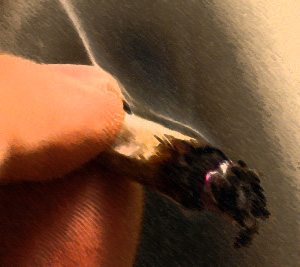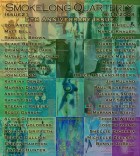Do you rely more on instinct or learned craft when writing?
In the first draft I’d say instinct and with edits I slow down and work on craft.
The psychological underbelly of this story intrigues me. For example: “He would say that the tarts symbolized something. And she’d argue that if she knew why, she’d have told him and everyone else a long time ago.” Also: “‘What if you put something else in the oven instead?’ Like my head, she thought, and licked the bowl.”
My ex-husband used to get up in the middle of the night and in the dark, while sleeping, go into the kitchen and forage. He’d be hunched by the refrigerator, eyes closed, chewing a Snickers bar and gulping milk from the carton. I just thought his actions were bizarre, until I read years later that he wasn’t the only one, there are more of them, those sneaky midnight eaters. When I read that, it started an idea for this story: wondering how people who have rare conditions cope.
“She can smell inside his glove compartment, cigars and tape. She can taste the shoulder of his wool sweater.” Great, unusual details!
I’ve heard a million times that because I’m a Virgo, I should be tidy and detail oriented. Take one glance at the back seat of my car and you’ll know different. What I am though is often on the hunt for the unusual detail. One of the cool things about being a writer is you can go to a wedding and savor the drunken uncle who flubs up the toast and the horses that are startled by the bagpipes and take off in the wrong direction with the bride in the carriage.
In your bio, you mention working on your MFA thesis. Can you tell us anything about it?
I’ll tell you it is due in four days. Oh no! I’m working on a collection of short stories about children, relationships and family. Broken people, people that love them, women baking sponges in their tarts, that sort of stuff.
This issue marks SmokeLong‘s fifth anniversary, which has me thinking about longevity and growth. There’s no denying the literary arena is a fickle one, with journals coming and going, writers shooting onto the scene then falling into a long hiatus, editors changing houses, agents merging, and the trends! Don’t even get me started! How do you, as a writer, endure the ups and downs? Have you experienced any setbacks? What measures have you taken to grow?
The Whidbey Writers MFA program has been a stretch of exciting challenge. Setbacks? Yes, my novel is sitting here without a home. I’ve had plenty of days when I’ve said to myself, “Who do you think you’re kidding—you fraud you!” And then I wallow around fraudulently until something sparks me again: a story idea, a glimmer of an odd detail, a compliment, an acceptance letter. I try to stay ahead of myself. For instance, I want to write a novel of connected stories. So, when I’m done with the thesis collection, have sought out to the ends of the earth the perfect agent for the novel, I plan to read other novel in-stories and then get going on mine. Can’t wait.



 In September 2022 SmokeLong launched a workshop environment/community christened SmokeLong Fitness. This community workshop is happening right now on our dedicated workshop site. If you choose to join us, you will work in a small group of around 15-20 participants to give and receive feedback on flash narratives—one new writing task each week.
In September 2022 SmokeLong launched a workshop environment/community christened SmokeLong Fitness. This community workshop is happening right now on our dedicated workshop site. If you choose to join us, you will work in a small group of around 15-20 participants to give and receive feedback on flash narratives—one new writing task each week.